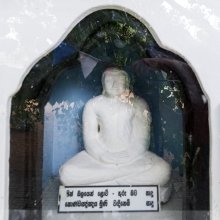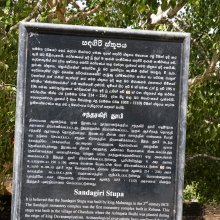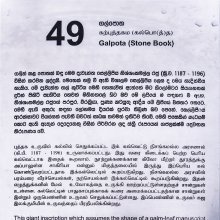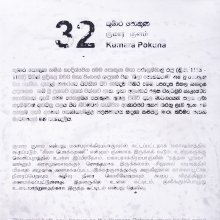Bava: 12 definitions
Introduction:
Bava means something in Hinduism, Sanskrit, the history of ancient India, Marathi, Jainism, Prakrit. If you want to know the exact meaning, history, etymology or English translation of this term then check out the descriptions on this page. Add your comment or reference to a book if you want to contribute to this summary article.
Images (photo gallery)
(+10 more images available)
In Hinduism
Jyotisha (astronomy and astrology)
Source: Wikibooks (hi): Sanskrit Technical TermsBava (बव).—The name of the five movable karaṇa, the karaṇa being one of the five important elements of the Hindu calendar. Note: Bava is a Sanskrit technical term used in ancient Indian sciences such as Astronomy, Mathematics and Geometry.

Jyotisha (ज्योतिष, jyotiṣa or jyotish) refers to ‘astronomy’ or “Vedic astrology” and represents the fifth of the six Vedangas (additional sciences to be studied along with the Vedas). Jyotisha concerns itself with the study and prediction of the movements of celestial bodies, in order to calculate the auspicious time for rituals and ceremonies.
India history and geography
Source: Cologne Digital Sanskrit Dictionaries: Indian Epigraphical GlossaryBāva.—(CII 3, etc.), a Prakrit word denoting ‘a relative of the same generation with the father’; generally, ‘an uncle’; used in Sanskrit inscriptions. Note: bāva is defined in the “Indian epigraphical glossary” as it can be found on ancient inscriptions commonly written in Sanskrit, Prakrit or Dravidian languages.
Source: Shodhganga: A translation of Jhaverchand Meghanis non translated folk tales1) Bava refers to “[Bavaji/ Bavoji/ Bava] Mendicant”.—It is defined in the glossary attached to the study dealing with Gujarat Folk tales composed by Gujarati poet Jhaverchand Meghani (1896-1947)
2) Bava refers to “[Bavaji/ Bavoji/ Bava] Mendicant”.—It is defined in the glossary attached to the study dealing with Gujarat Folk tales composed by Gujarati poet Jhaverchand Meghani (1896-1947)

The history of India traces the identification of countries, villages, towns and other regions of India, as well as mythology, zoology, royal dynasties, rulers, tribes, local festivities and traditions and regional languages. Ancient India enjoyed religious freedom and encourages the path of Dharma, a concept common to Buddhism, Hinduism, and Jainism.
Languages of India and abroad
Marathi-English dictionary
Source: DDSA: The Molesworth Marathi and English Dictionarybava (बव).—n S The first of the eleven astronomical karaṇa.
--- OR ---
bāva (बाव).—f C A well, a field-well in general, small or large, with steps or without. It is synonymous with vihīra.
--- OR ---
bāvā (बावा) [or बावाजी, bāvājī].—m A term of respectful compellation or mention for a gōsāvī, gurū, father, or elderly person gen. See vyāvahārika nāṃva. 2 C Applied in endearment to a little boy.
--- OR ---
bāvā (बावा).—m A plant, commonly bāhavā, Cassia fistula.
Source: DDSA: The Aryabhusan school dictionary, Marathi-Englishbāva (बाव).—f A well. bāvakhōla n A dry and partly filled up well.
--- OR ---
bāvā (बावा).—m A term of respectful compella- tion for a gōsāvī, gurū, or an elderly person.
Marathi is an Indo-European language having over 70 million native speakers people in (predominantly) Maharashtra India. Marathi, like many other Indo-Aryan languages, evolved from early forms of Prakrit, which itself is a subset of Sanskrit, one of the most ancient languages of the world.
Sanskrit dictionary
Source: DDSA: The practical Sanskrit-English dictionaryBava (बव).—The first Karaṇa or astrological division of the day.
Derivable forms: bavaḥ (बवः).
Source: Cologne Digital Sanskrit Dictionaries: Monier-Williams Sanskrit-English Dictionary1) Bava (बव):—n. (also written vava) Name of the first Karaṇa or astrological division of the day, [Sūryasiddhānta]
2) Name of a Karaṇa (half a Tithi), [Inscriptions]
Source: DDSA: Paia-sadda-mahannavo; a comprehensive Prakrit Hindi dictionary (S)Bava (बव) in the Sanskrit language is related to the Prakrit word: Bava.
[Sanskrit to German]
Sanskrit, also spelled संस्कृतम् (saṃskṛtam), is an ancient language of India commonly seen as the grandmother of the Indo-European language family (even English!). Closely allied with Prakrit and Pali, Sanskrit is more exhaustive in both grammar and terms and has the most extensive collection of literature in the world, greatly surpassing its sister-languages Greek and Latin.
Prakrit-English dictionary
Source: DDSA: Paia-sadda-mahannavo; a comprehensive Prakrit Hindi dictionary1) Bava (बव) in the Prakrit language is related to the Sanskrit word: Brū.
2) Bava (बव) also relates to the Sanskrit word: Bava.
Prakrit is an ancient language closely associated with both Pali and Sanskrit. Jain literature is often composed in this language or sub-dialects, such as the Agamas and their commentaries which are written in Ardhamagadhi and Maharashtri Prakrit. The earliest extant texts can be dated to as early as the 4th century BCE although core portions might be older.
Kannada-English dictionary
Source: Alar: Kannada-English corpusBava (ಬವ):—
1) [noun] an act or instance of being born; birth.
2) [noun] the period in one’s life from birth to death; life.
--- OR ---
Bava (ಬವ):—[noun] (astrol.) name of one of the eleven divisions of a lunar day.
--- OR ---
Bāva (ಬಾವ):—
1) [noun] the husband of one’s elder sister.
2) [noun] an elder brother of one’s husband.
3) [noun] a son of one’s maternal uncle or paternal aunt.
4) [noun] an elder brother of one’s wife.
5) [noun] a term of endearment, used to address a man even though not related.
--- OR ---
Bāvā (ಬಾವಾ):—[noun] an ascetic, usu. having long hairs, who wanders from place to place.
--- OR ---
Bāvā (ಬಾವಾ):—[noun] the medium sized, deciduous tree Cassia fistula of Caesalpiniaceae family.
Kannada is a Dravidian language (as opposed to the Indo-European language family) mainly spoken in the southwestern region of India.
See also (Relevant definitions)
Starts with (+86): Bavabandi, Bavaca, Bavacala, Bavacalanem, Bavacem, Bavachi, Bavaci, Bavada, Bavade, Bavadeva, Bavadi, Bavadidasavamda, Bavaharana, Bavaji, Bavajuda, Bavaka, Bavakarana, Bavake, Bavakhairati, Bavakhanda.
Ends with (+12): Ambava, Ayacitabava, Bibava, Bimbava, Bodhalabava, Dabava, Dhunibava, Dubava, Gajabava, Hel-bava, Helbava, Jallibava, Jambava, Kabava, Kalabava, Kh-airbava, Khairbava, Kulambava, Kunabava, Lambavalambava.
Full-text (+13): Bavadeva, Bavashastrin, Bavaji, Bova, Bavakarana, Pen-bava, Hel-bava, Bva, Bavacala, Satoba, Mothabva, Bru, Parababa, Vadaloba, Buva, Kadadongara, Dantabhagna, Bavanca, Harababi, Manippavam.
Relevant text
Search found 7 books and stories containing Bava, Bāva, Bāvā; (plurals include: Bavas, Bāvas, Bāvās). You can also click to the full overview containing English textual excerpts. Below are direct links for the most relevant articles:
Brihat Samhita (by N. Chidambaram Iyer)
‘The Songs of Yenki’ Moving Lyrical Ballads < [July 1957]
‘The Songs of Yenki’ Moving Lyrical Ballads < [July 1957]
I Remember “Kinnerasani” < [October – December, 1996]
Ramayana of Valmiki (by Hari Prasad Shastri)
Chapter 27 - Shri Rama is given the celestial weapons < [Book 1 - Bala-kanda]
Folk Tales of Gujarat (and Jhaverchand Meghani) (by Vandana P. Soni)
Chapter 39 - Parkaya Pravesh < [Part 5 - Rang Chee Barot]
Chapter 6 - Natho Modhvadio (Around 1830) < [Part 2 - Sorathi Baharvatiya]
Impact of Vedic Culture on Society (by Kaushik Acharya)
Sanskrit Inscriptions (F): The Early Gurjaras < [Chapter 3]
Religious Epithets (Brahmanical and Buddhist) < [Chapter 4]
3. The Donee Brāhmaṇas < [Chapter 2]
The Agni Purana (by N. Gangadharan)





